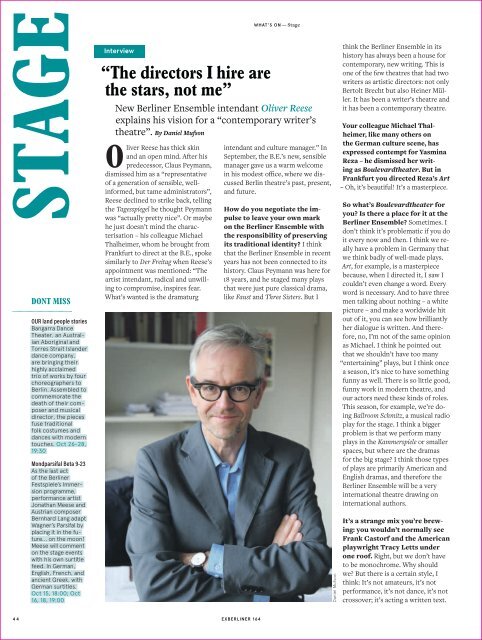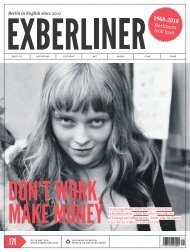EXBERLINER Issue 164, October 2017
Create successful ePaper yourself
Turn your PDF publications into a flip-book with our unique Google optimized e-Paper software.
WHAT’S ON — Stage<br />
DONT MISS<br />
OUR land people stories<br />
Bangarra Dance<br />
Theater, an Australian<br />
Aboriginal and<br />
Torres Strait Islander<br />
dance company,<br />
are bringing their<br />
highly acclaimed<br />
trio of works by four<br />
choreographers to<br />
Berlin. Assembled to<br />
commemorate the<br />
death of their composer<br />
and musical<br />
director, the pieces<br />
fuse traditional<br />
folk costumes and<br />
dances with modern<br />
touches. Oct 26-28,<br />
19:30<br />
Mondparsifal Beta 9-23<br />
As the last act<br />
of the Berliner<br />
Festspiele’s Immersion<br />
programme,<br />
performance artist<br />
Jonathan Meese and<br />
Austrian composer<br />
Bernhard Lang adapt<br />
Wagner’s Parsifal by<br />
placing it in the future...<br />
on the moon!<br />
Meese will comment<br />
on the stage events<br />
with his own surtitle<br />
feed. In German,<br />
English, French, and<br />
ancient Greek, with<br />
German surtitles.<br />
Oct 15, 18:00; Oct<br />
16, 18, 19:00<br />
Interview<br />
“The directors I hire are<br />
the stars, not me”<br />
New Berliner Ensemble intendant Oliver Reese<br />
explains his vision for a “contemporary writer’s<br />
theatre”. By Daniel Mufson<br />
Oliver Reese has thick skin<br />
and an open mind. After his<br />
predecessor, Claus Peymann,<br />
dismissed him as a “representative<br />
of a generation of sensible, wellinformed,<br />
but tame administrators”,<br />
Reese declined to strike back, telling<br />
the Tagesspiegel he thought Peymann<br />
was “actually pretty nice”. Or maybe<br />
he just doesn’t mind the characterisation<br />
– his colleague Michael<br />
Thalheimer, whom he brought from<br />
Frankfurt to direct at the B.E., spoke<br />
similarly to Der Freitag when Reese’s<br />
appointment was mentioned: “The<br />
artist intendant, radical and unwilling<br />
to compromise, inspires fear.<br />
What’s wanted is the dramaturg<br />
intendant and culture manager.” In<br />
September, the B.E.’s new, sensible<br />
manager gave us a warm welcome<br />
in his modest office, where we discussed<br />
Berlin theatre’s past, present,<br />
and future.<br />
How do you negotiate the impulse<br />
to leave your own mark<br />
on the Berliner Ensemble with<br />
the responsibility of preserving<br />
its traditional identity? I think<br />
that the Berliner Ensemble in recent<br />
years has not been connected to its<br />
history. Claus Peymann was here for<br />
18 years, and he staged many plays<br />
that were just pure classical drama,<br />
like Faust and Three Sisters. But I<br />
Daniel Mufson<br />
think the Berliner Ensemble in its<br />
history has always been a house for<br />
contemporary, new writing. This is<br />
one of the few theatres that had two<br />
writers as artistic directors: not only<br />
Bertolt Brecht but also Heiner Müller.<br />
It has been a writer’s theatre and<br />
it has been a contemporary theatre.<br />
Your colleague Michael Thalheimer,<br />
like many others on<br />
the German culture scene, has<br />
expressed contempt for Yasmina<br />
Reza – he dismissed her writing<br />
as Boulevardtheater. But in<br />
Frankfurt you directed Reza’s Art<br />
– Oh, it’s beautiful! It’s a masterpiece.<br />
So what’s Boulevardtheater for<br />
you? Is there a place for it at the<br />
Berliner Ensemble? Sometimes. I<br />
don’t think it’s problematic if you do<br />
it every now and then. I think we really<br />
have a problem in Germany that<br />
we think badly of well-made plays.<br />
Art, for example, is a masterpiece<br />
because, when I directed it, I saw I<br />
couldn’t even change a word. Every<br />
word is necessary. And to have three<br />
men talking about nothing – a white<br />
picture – and make a worldwide hit<br />
out of it, you can see how brilliantly<br />
her dialogue is written. And therefore,<br />
no, I’m not of the same opinion<br />
as Michael. I think he pointed out<br />
that we shouldn’t have too many<br />
“entertaining” plays, but I think once<br />
a season, it’s nice to have something<br />
funny as well. There is so little good,<br />
funny work in modern theatre, and<br />
our actors need these kinds of roles.<br />
This season, for example, we’re doing<br />
Ballroom Schmitz, a musical radio<br />
play for the stage. I think a bigger<br />
problem is that we perform many<br />
plays in the Kammerspiele or smaller<br />
spaces, but where are the dramas<br />
for the big stage? I think those types<br />
of plays are primarily American and<br />
English dramas, and therefore the<br />
Berliner Ensemble will be a very<br />
international theatre drawing on<br />
international authors.<br />
It’s a strange mix you’re brewing:<br />
you wouldn’t normally see<br />
Frank Castorf and the American<br />
playwright Tracy Letts under<br />
one roof. Right, but we don’t have<br />
to be monochrome. Why should<br />
we? But there is a certain style, I<br />
think: It’s not amateurs, it’s not<br />
performance, it’s not dance, it’s not<br />
crossover; it’s acting a written text.<br />
44<br />
<strong>EXBERLINER</strong> <strong>164</strong>


















